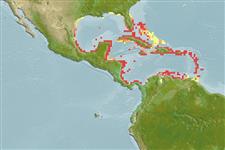Common names from other countries
Classification / Names / Names
आम नाम | उपशब्द | Catalog of Fishes (gen., sp.) | ITIS | CoL | WoRMS
Environment: milieu / climate zone / depth range / distribution range
पारिस्थितिकी
; गहराई सीमा 0 - 1 m (Ref. 83435). Tropical; 32°N - 9°N, 97°E - 0°E (Ref. 83435)
Western Central Atlantic.
Length at first maturity / आकार / वज़न / Age
Maturity: Lm ? range ? - ? cm Max length : 1.0 cm DL पुल्लिंग / अलिंग; (Ref. 83435)
Life cycle and mating behavior
परिपक्व अवधि | पुनरुत्पत्ति | मछलीऔ का अंडे देना | अंडे | Fecundity | लार्वा
Members of the order Neotaenioglossa are mostly gonochoric and broadcast spawners. Life cycle: Embryos develop into planktonic trocophore larvae and later into juvenile veligers before becoming fully grown adults.
Miloslavich, P., J.M. Díaz, E. Klein, J.J. Alvarado, C. Díaz, J. Gobin, E. Escobar-Briones, Motta, J.J. Cruz, E. Weil, J. Cortés, A.C. Bastidas, R. Roberston, F. Zapata, A. Martín, J. Castillo, A. Kazandjian and M. Ortiz. 2010. (Ref. 86671)
IUCN Red List Status (Ref. 130435: Version 2024-1)
CITES status (Ref. 108899)
Not Evaluated
Not Evaluated
Human uses
| FishSource |
साधन
अधिक जानकारी
Age/Size
बाढ़
Length-weight
Length-length
आकृति विज्ञान
लार्वा
बहुतायत
इंटरनेट स्रोत
Estimates based on models
Preferred temperature
(Ref.
115969): 26 - 28.3, mean 27.3 (based on 336 cells).
Vulnerability
Low vulnerability (10 of 100).
Price category
Unknown.
